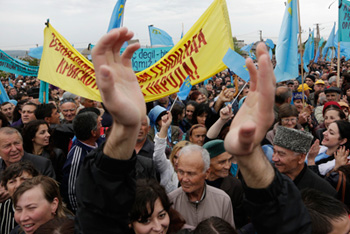

Vol. 78/No. 36 October 13, 2014

|
| AP Photo/Max Vetrov |
| Despite Moscow’s ban, more than 20,000 Crimean Tatars rallied May 18 in Simferopol, Crimea, on 70th anniversary of Tatars’ mass deportation by Soviet government of Joseph Stalin. |
Tatars in the Crimean Peninsula overwhelmingly support a united, sovereign Ukraine and have demonstrated by the tens of thousands against the Russian government’s invasion and annexation of Crimea, as well as Russian military intervention and support to separatist paramilitary forces in east Ukraine.
The Crimean Tatars, the original inhabitants of the peninsula, have been an oppressed nationality since they were conquered by the Russian empire in 1783. In 1944, Soviet Premier Joseph Stalin labeled the Crimean Tatars en masse as Nazi collaborators and deported them to Uzbekistan and Siberia. More than 40 percent perished in the journey. Dzhemilev, then less than a year old, was deported with his family to Uzbekistan.
While working at the Tashkent Aviation Factory as a teenager, Dzhemilev joined the Crimean Tatar Youth League to campaign for their right to return to their homeland. He was arrested on several occasions, spending a total of 15 years in prison.
As the Soviet Union was coming apart, Dzhemilev and his family returned to Crimea, where in 1991 he was elected chair of the Mejlis, the national committee of the Crimean Tatars. He stepped down as chair in 2013, replaced by Refat Chubarov.
Since the Russian seizure of Crimea in March, there have been a series of repressive measures imposed on Tatar communities, including raids on mosques and schools, efforts to ban protests and attempts to silence leaders of the Mejlis. In May, the Russian government issued a five-year ban against Dzhemilev, barring him from returning to Crimea. Met by 5,000 Crimean Tatars who came to greet him, Dzhemilev attempted to enter and was physically stopped.
The attacks have escalated since Sept. 14 elections in Russia and occupied Crimea. “The Mejlis met July 6 and decided to call for a boycott of the elections,” Dzhemilev said. “To have participated would have meant recognition of the occupation.”
“The authorities responded by putting a five-year ban on Chubarov,” he said.
Turnout for the election in Crimea was officially around 52 percent, although a jump of 15 percent in the last 46 minutes was seen by many as evidence of fraud. “The election returns were falsified by the officials,” Dzhemilev said.
On Sept. 16, 20 members of the Russian Federal Security Service and other police forces raided the Mejlis headquarters in Simferopol, searching the offices for 12 hours. They hauled off laptops, computers, records and files, and broke into Dzhemilev’s personal safe and removed money and all his belongings. As they left, they handed Riza Shevkiev, a Mejlis member and head of the Crimean Charity Fund, which owns the building, an eviction notice to get out within 24 hours.
Similar raids were carried out at the homes of Mejlis leaders Eskender Bariev and Mustafa Asaba. The next day raids on schools, mosques and homes of Tatar figures took place across Crimea.
On Sept. 22 the Russian-installed Crimean Prime Minister Sergey Aksyonov declared that the Mejlis “does not exist.” He said that those who sow discord on an inter-ethnic basis will be expelled from Crimea or face criminal charges.
In a Sept. 24 statement, the Russian Foreign Ministry said that the offices were seized and the organizations evicted because the Crimean Fund was illegally founded by a “foreign national” and an “undesirable” — Mustafa Dzhemilev.
Dzhemilev and Chubarov represented the Mejlis at the first United Nations World Conference on Indigenous Peoples in New York Sept. 22-23. Moscow tried unsuccessfully to have them barred from participating. They succeeded in keeping Nadir Bekirov, another Crimean Tatar delegate, from attending. He was accosted by four armed and masked thugs who seized his passport as he was heading to the train station in Dzhankoi.
“Crimea Tatars are the people who suffered total deportation from their native land in 1944, their return to the native land became possible on the eve of the Soviet Union collapse and coincided with establishment of independent Ukraine,” Chubarov said to the conference. He said they joined with millions of others who from November 2013 to February 2014 demonstrated to demand the overthrow of the pro-Russian government of Ukrainian President Viktor Yanukovych.
“Our hopes to restore our rights were wiped out at the end of February-March 2014,” he said, by “the occupation and annexation of Crimea by the Russian Federation.”
“We call on the U.N. to establish a special mission on Crimea,” Chubarov said.
“We were seeking world attention and help in defending the rights of the Crimean Tatars,” Dzhemilev told the Militant. “We found genuine interest in the situation of our people, and got our story out through press interviews with media from all over the world.
“But we fear that more attacks will come,” he said, “more bans, more efforts to shut the Mejlis down and silence our press. But their efforts to stop the fight for democratic rights will not succeed.
“The Russian authorities are afraid of us,” Dzhemilev said. “They know that if we have the political rights to organize and resist, they will have more and more difficulty installing their rule.”
Front page (for this issue) |
Home |
Text-version home